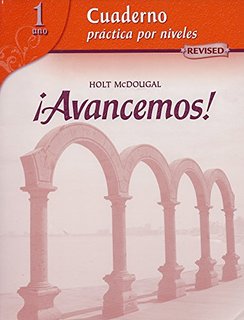
All Solutions
Page 346: Vocabulario C
|–|–|
|1. la toalla *(a towel)* |7. el hotel (*a hotel)*|
|2. el peine *(a hair comb)* |8. el avión *(a plane)* |
|3. el cepillo de dientes *(a toothbrush)* |9. el campo *(a countryside)* |
|4. el secador de pelo *(a hair dryer)* |10. el viaje *(a trip)* |
|5. el champú (a shampoo) |11. el tren *(a train)* |
|6. el jabón (a soap) |12. el barco *(a ship)* |
**Hint:** You should use reflexive verbs and appropriate pronouns.
He has to **hurry up.**
*(Tiene que **apurarse**.)*
*Marcos* is third-person singular, that is why we added ***-se*** at the verb *apurar (to hurry up).*
He has to **shower/bathe.**
*(Tiene que **ducharse/bañarse**.)*
*Marcos* is third-person singular, that is why we added ***-se*** at the verbs *duchar/bañar (to shower/bathe).*
He needs to **dry it.**
*(Necesita **secarlo**.)*
*El pelo* here functions as a **direct object** so we will use the appropriate pronoun in third-person singular, which is ***-lo*** and add it to the verb *secar (to dry)*.
He does not have to shave.
*(No tiene que **afeitarse**.)*
*Marcos* is third-person singular, that is why we added the pronoun ***-se*** at the verb *afeitar (to shave).*
1. apurarse
2. bañarse
3. secarlo
4. afeitarse
**Hint:** You will use a lot of reflexive verbs, so pay attention to the pronouns as well.
*(I shower in the morning and brush my teeth before breakfast.)*
*(Later I comb my hair with a comb.)*
*(I dress in clothes that I choose that day.)*

